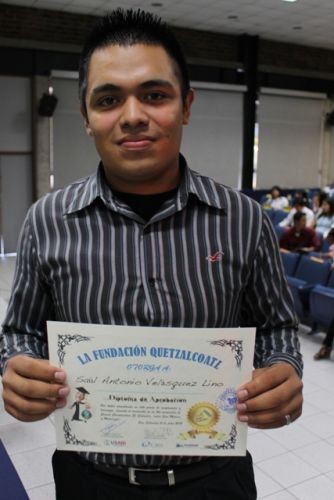
For Immediate Release
This afternoon, 80 youth from San Marcos and Mejicanos received certificates for their participation in vocational courses, service and leadership in the Youth Builders Program: Creating Jobs for Economic Recovery. This initiative of the United States Agency for International Development (USAID) and US-based Catholic Relief Services (CRS) also held today the signing of a cooperative agreement with the Salvadoran Professional Training Institute (INSAFORP) to strengthen the training of participant youth.
Youth Buildersis part of the efforts of Partnership for Growth, an initiative signed by the governments of El Salvador and the United States in November 2011. The program focuses on serving youth at-risk between the ages of 16 and 25 for access to economic opportunities and engagement in productive activities. To achieve these goals, participating youth receive training and participate in service opportunities, leadership, learning skills for work and life as well as a vocational choice.
Through its partners, the Ideas Foundation and Actions for Peace Quetzalcoatl and the Fe y Alegría Association, the program has formed strategic alliances with the Ministry of Labor, the General Directorate for Violence Prevention and a Culture of Peace (PREPAZ), the National Commission for Micro and Small Enterprises(CONAMYPE) and companies such as Enlaces Financial Services, Integral, Go Green, Coffee Cup, Crio Inversiones, Estrucoms, Grupo Megaand others to create opportunities for training and integration of youth at risk.
The official signing of the interinstitutional agreement between CRS and INSAFORP is expected to strengthen the Youth Builders programin the country, and to benefit new groups of participants that will start trainings in the upcoming weeks.
New graduates are prepared for employment, self-employment or educational opportunities. The courses provided include visual arts, cosmetology, courier services and motorcycle driving, bakery and auto mechanics. To date, 17 young adults have obtained employment, 11 have started their own businesses and another 13 are awaiting approval of their business plans and access to financial aid. The CRS and Quetzalcoatl Foundation teams are coordinating employment opportunities with Pollo Real, Pizza Hut, Telefonica Movistar, and Claro, El Diario de Hoy, beauty salons Poison and Vidal, among others. The program has also worked closely with the Sabor Amigo Company to train young entrepreneurs.
Since March 2010, 2.243 youth at risk have been trained in four classes lasting six months. In the first three classes, 83.2% completed the training. 68% of participants who completed the training have been inserted into the labor market or have returned to their studies. Five out of 10 (55%) have made it into some productive activity (employment or microenterprise), becoming leaders in their families and communities. Furthermore, 36% of young employees receive job benefits (retirement and healthcare), which is a higher percentage than the national average for workers in general (22%). This transformation is achieved through the efforts of multidisciplinary teams, a holistic approach, support from 180 companies, and above all, the decision of participating youth to be responsible for their future.
The graduation ceremony was presided over by the Program Manager of USAID Bilateral Economic Growth Program, Carlos Arce; the President of INSAFORP, Ricardo Montenegro; the Director of CRS El Salvador, Erica Dahl Bredine; and the Director of the Quetzalcoatl Foundation, Mauricio Figueroa.
Related Press Releases
- Study Affirms Impact of USAID Prevention Approach to Crime and Violence in Central America
- USAID, Keurig Green Mountain, Cooperative Coffees, Starbucks and Root Capital Launch $23 Million Resilience Fund to Help Farms Fighting Coffee Rust Crisis
- TRAINING CENTER FOR CHILDREN AND YOUTH OPENS IN ATIQUIZAYA







Comment
Make a general inquiry or suggest an improvement.